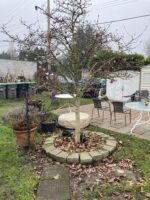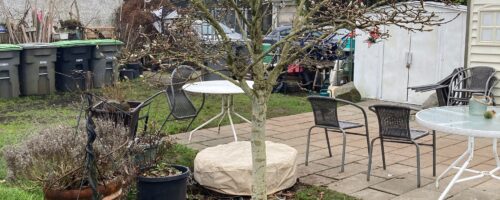
16 Oaks Community Garden, 1018 W 16th Ave, Vancouver, BC V6H 1S6, Canada

As I walked around my community garden I thought about the question “Think about the concept of knowledge. What does it mean? What knowledge is important? Who decides what knowledge is important?”. To me knowledge is freedom. I truly believe in that old saying that “knowledge is power”, and this is why I believe knowledge is so important. When I was little I used to say “The more you know, the less you don’t know.” This might seem like a silly saying, but it holds a lot of meaning for me. Not only is knowledge power, but it is also the key to love, acceptance, empathy, and understanding. I think that a lot of the hate and prejudice that people hold in the world can be directly linked to ignorance. It is natural for us as humans to fear what we don’t know, and fear can often times lead to hate. I have observed, however, that the communities that seem the closest and happiest are those where acceptance (which I believe is rooted in knowledge) is promoted and maintained.
Knowledge is also a tricky thing, for those who hold power determine what knowledge is, what knowledge is taught, and who has the access to such knowledge. How does that work if knowledge is power, but knowledge is also controlled by the powerful? It means that some knowledge is lost and/or filtered. An example of this in our local community is the knowledge and history of Indigenous peoples in Canada. Just last year when I was taking a Canadian history course in order to qualify for the BEd program, the textbook we were given painted this picture of Canada as a country that has always been multicultural and peaceful. I remember reading the chapter about how Canada was founded, it talked a lot about settlers and the politicians who created the Canada we know today, but it neglected to talk about the slaughter, removal, and relocation of the hundreds and thousands of Indigenous peoples that made modern Canada possible. My dad always says “history is written by the victors”, which would always make me angry as a kid because that just didn’t seem fair, but it is unfortunately very true.
I can also think about knowledge in my own personal context. My family is Greek, and on my dad’s side we have a rich history that can be traced back centuries. However, when my grandfather (dad’s dad) immigrated to the United States he changed our last name to become more “Americanized” from Mavromihalis to Boides. This was my dad’s last name while he was growing up. He grew up not knowing much about our family history or about his parent’s past. Understandably it was difficult to talk about. My grandparents had left a war-torn country, and memories of their childhood were filled with death, famine, poverty, devastation, and destruction; but my dad always wanted to know more. When they moved back to Greece when my dad was in his pre-teen years he set off to gain knowledge about our family history. When he was 14 my dad took a bus from Athens to Mani and what he learned about our family was exciting and pride evoking. This knowledge was never lost on me, my dad is a bit of a history buff and I remember him going on and on for hours about how our family helped start the Greek Revolution against the Ottoman Turks in our region. To me this knowledge is powerful, as it creates a narrative of who I am, what/where I come from, and ultimately how I came to be.

